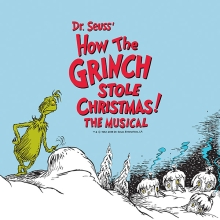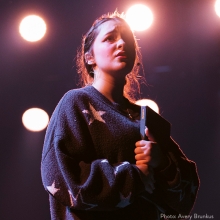Filichia's Features: Fiddler On The Roof is Still Flying High
Filichia's Features: Fiddler On The Roof is Still Flying High
Wonder of wonders, miracle of miracles! Last Saturday, I was at the State Theater in New Brunswick, New Jersey to see the National Touring production of Fiddler On The Roof – and saw that the 1,800-seat showplace was jam-packed.
Not bad for a show that opened in the early days of the Johnson Administration. And while we’d all agree with Tevye the milkman’s claim to his long-suffering wife Golde, “It’s a new world,” how wonderful that Fiddler On The Roof is still a part of it. After 48 years, it’s nice to know.
But true quality never goes out of style, does it? In its first song, Fiddler shows it always aimed high. Here, when Tevye tells us about the traditions in his home town of Anatevka, he mentions that “We always keep our heads covered and we always wear a little prayer shawl. This shows our constant devotion to God.” A lesser writer than Fiddler’s librettist Joseph Stein would have added, “And it gets mighty cold here in Russia.” But by opting not to have a joke here, Stein establishes the important element that these are a religious people first and foremost. (Needless to say, devotion to God causes a big second-act conflict.)
One good spot for humor occurs in the scene where Tevye converses with Lazar Wolf, assuming that the butcher wants to buy his cow. Lazar, however wants permission to marry Tevye’s eldest daughter Tzeitel. So when Tevye says, “Why should I get rid of her?” Lazar rebuts that “You have a few more without her.” Tevye, still thinking that Lazar means cows, not daughters, says “Today you want one; tomorrow, you may want two.” The confusion is growing and a lesser librettist would have had the misunderstanding go on for many minutes more, straining credulity along the way. Within the next minute, Stein stops joking and clears up the confusion.
Nevertheless, Stein doesn’t let the humor run away from the inherent seriousness in the scene. Lazar is so intent on marrying Tzeitel that he says he’ll waive the dowry – “and,” he says pointedly to Tevye, “maybe you’ll find something in your own purse, too.”
Tevye now feels that Lazar has crossed the line. If a father agreed to that, he’d be prostituting his daughter. And while by this point Tevye knows the great economic value of the match – that Tzeitel will lead a comfortable life – he still must remain true to his principles. If blatantly chiding Lazar with “Shame on you! Shame” ruins the marriage plans, so be it.

Fiddler is famous for one great role – Tevye – but there are other fine ones on hand, too, if the performers realize just how significant they are. Take the tailor Motel Kamzoil, who’s little more than a scared rabbit when we first meet him. Yes, he wants to marry Tzeitel, but he can’t see how he can manage it. But Motel rises to occasion before it's too late, throwing the verbal equivalent of a Hail Mary pass to get Tevye to give him Tzeitel.
In the wedding scene, when Motel dons a formal wedding hat, we see that it empowers him (and not because he’s getting a swelled head). Then when he decides to dance with (horrors!) his bride, we see him take firm command. He grows even more mensch-like in the second act. Andrew Boza did all this splendidly.
And of course Motel is an integral part of one of the most delicious fake-outs in Broadway musical history. Deep in the second act, after he and Tzeitel have been married for some time, the townspeople are all talking about “the new arrival” at their home. We’re taken to the house, where everyone is gathered around … not a baby, but Motel’s new sewing machine. We get a good laugh at ourselves for jumping to conclusions, but the scene also lets us see more of Motel’s growth; his being the first on his block to get such a new-fangled device puts him on (no pun intended) the cutting edge.
Many performers have played Yente the Matchmaker as acid-tongued, probably because they’re used to hearing Beatrice Arthur dourly intone her lines on the cast album. Arthur does sound as if she’s just out to make a buck. Here, Barbi McGuire instead decided to show us a matchmaker who really thought that she was doing a genuine service that would bring happiness to all. It’s a good approach.
How nice that frequent Fiddler stager Sammy Dallas Bayes allowed it. Bayes, who was part of the original Jerome Robbins production, is certainly the keeper of the flame. He has spent many of the last 48 years reproducing the direction and choreography that Broadway saw on Sept. 22, 1964.
So in “Matchmaker, Matchmaker,” sisters Tzeitel, Hodel and Chava are still washing the floor, but each takes time to shuffleboard her mop across the stage. Brooke Hills, Sarah Sesler and Chelsea LeBel pitched and caught with major-league skill, but they also acted impeccably, too.
Credit is due to the four chorus members who managed to dance while bottles were on their hats. The key word is “on,” for far too many productions essentially place the bottles “in” the hats, in circular recesses that are as deep as saucepans. Anyone who’s staging the “Bottle Dance” should insist that his performers learn to do it properly, no matter how long that takes. Otherwise, the dazzling effect is ruined. And if a cast member in Zorba can pick up a table with his teeth – and I’ve seen actors do it in both professional and community theater productions – then dancers can balance bottles on their heads.

Fiddler is of course enhanced by the magnificent score that composer Jerry Bock and lyricist Sheldon Harnick wrote. Few opening numbers are as strong as “Tradition” in establishing time, place and characters. “If I Were a Rich Man” is more a musical scene than a song. “To Life” is as joyous as a song by that title must be.
When Harnick was writing “To Life,” he must have danced around his study for 20 straight minutes after he’d found an especially felicitous rhyme: when Tevye sings, “Here’s to the father I tried to be,” followed by Lazar’s “Here’s to my bride-to-be.” How often is “to be” used in two distinctly different contexts?
And then, of course, there’s “Sunrise, Sunset,” that shows us the inner thoughts that Tevye and Golde have at the wedding. “Is this the little girl I carried? Is this the little boy at play?” Tevye sings before Golde muses, “I don’t remember growing older; when did they?” Which parent can’t relate to that universal truth?
Although no recording artist ever had a hit with “Sunrise, Sunset,” it’s become a true standard in the last four decades, when every band at a wedding, bar- or bat-mitzvah has played it. Here in New Brunswick, David B. Springstead, Sr. and Gerri Weagraff made the song sound newly minted. True pros never go on automatic pilot or phone-in mode.
In many a musical, the lights will occasionally dim, and out will come black-clad techies to quickly get set pieces off from the just-concluded scene and/or get the now-needed pieces for the upcoming one. Bless them all, now and forever, for their hard work. But they’re less needed in Fiddler. Somehow, the look of Anatevkans carting on large pieces seems very much in keeping with people who do a lot of day-in-day-out manual labor.
Fiddler isn’t an expensive show to do. Basements and thrift shops may well yield appropriate working-class clothes and the not-so-new furniture it requires. After all, Anatevkans don’t have homes that would be featured in Architectural Digest. And because Anatevka doesn’t have a dynamic skyline, a blue cyclorama easily represents what one would see there on a clear day. A unit set can serve as Tevye’s house, but splitting it in two somehow makes it seem to be the tavern where Tevye and Lazar negotiate. All in all, a single small U-Haul could accommodate everything one needs to present Fiddler on the Roof.
But don’t just accept anything as sets, costumes – or even props. A West Virginian woman once told me about her community theater’s production. All was going well until the tender scene arrived in which Tevye brings Hodel to the train station. With suitcase in hand, she’s ready to travel to Siberia to be with Perchik, her fiancé who’s been arrested for sowing the seeds of the Russian Revolution. Here Hodel sings the score’s most tender and heartbreaking song, “Far from the Home I Love,” in which she subtly acknowledges that she’s seeing her father for the last time. Tevye knows it, too, but both endeavor to be brave.
However, the poignancy of this song and scene were undercut by the suitcase that had been recycled for this production. Even those with less than 20-20 vision could see that it once had said “Professor Harold Hill.”

You may e-mail Peter at pfilichia@aol.com. Check out his weekly column each Tuesday at www.masterworksbroadway.com and each Friday at www.kritzerland.com. His newest book, Broadway MVPs: 1960-2010 – The Most Valuable Players of the Past 50 Seasons, is now available through Applause Books and at www.amazon.com.


























